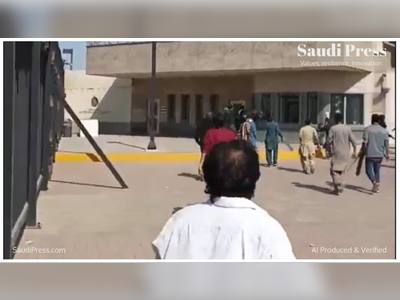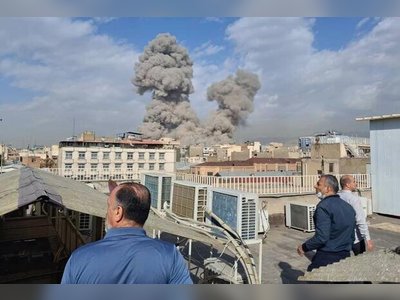
Patience of the world with Lebanon ‘wearing thin over lack of reforms’
Saadeh Al-Shami, Lebanon’s caretaker deputy prime minister, warned on Tuesday that “although international institutions are still interested in helping Lebanon,” the patience of the international community is wearing thin because of the slow pace of economic reforms in the country.
He said that the attention of the world is instead shifting toward poor and emerging countries that are struggling as a result of difficult global economic conditions.
Lebanon has been gripped by a devastating economic crisis since October 2019 that has left two-thirds of the population in poverty.
Al-Shami, who led the Lebanese delegation at the annual meetings of the International Monetary Fund and the World Bank from Oct. 10 to 16 in Washington, said: “Lebanon must abide by the constitutional deadlines, including for presidential elections and the formation of a government with full powers, to expedite the implementation of the necessary reforms so as not to lose the support of the international community in these difficult circumstances.
“We cannot ask of others what we do not ask of ourselves; we have to help ourselves so others can help us.”
A parliamentary session took place on Tuesday to elect members of official committees, followed by a legislative session the agenda for which included a draft law intended to transform banking operations in the country and make them more transparent, which is a key reform required by the IMF before international economic assistance can be provided.
MP Ibrahim Kanaan, head of the Finance and Budget Committee, said: “We are coordinating with the IMF and have agreed on the majority of items in the draft law, with the exception of a pivotal and essential item related to protecting the depositors’ personal information and rights.”
However, activist groups such as the Legal Agenda, Kulluna Irada, the Committee for the Protection of the Rights of Depositors, and the Lebanese Association for Taxpayers’ Rights staged a protest against the parliamentary committee for making amendments to the draft banking law that disregard its main purpose, which is to eliminate secrecy in the sector and establish mechanisms to ensure accountability.
Sibylle Rizk, Kulluna Irada’s director of public policies, said: “Auditing the accounts of the central bank and other banks and determining the sources of funds is the starting point for restructuring the banking sector in a fair manner for depositors, and in a healthy way to advance the economy.
“Lifting banking secrecy is a pillar of any recovery plan. It is no coincidence that the IMF considers it a priority.”
Lawyer Karim Daher, from the Lebanese Association for Taxpayers’ Rights and the Committee for the Protection of the Rights of Depositors at the Beirut Bar Association, said: “Lifting banking secrecy enables the distinction to be made between legitimate and illegal deposits, and thus to equitably distribute the responsibilities and burdens resulting from the economic collapse and the restructuring of debts and the banking sector.”
The Legal Agenda’s co-founder and executive director, Nizar Saghieh, said: “Parliament’s Finance and Budget Committee ignored the IMF’s observations in terms of linking the competence of the tax authorities to issues of combating tax evasion.
“It also did not apply the retroactive law to the time period that caused the economic and financial crisis on bank owners and managers, thus absolving them of all blame.”
According to a report published by the World Bank on Oct. 13, Lebanon is one of 20 countries that has imposed a number of bans on the export of basic foods to address domestic scarcity. On March 18, authorities banned the export of fruit and vegetables, milled grain products, sugar and bread, until the end of this year, and permanently banned the export of meat products, fish, potatoes and some other foods. In all, 29 bans were put in place.
Bechara Al-Asmar, the head of Lebanon’s General Labor Union, demanded that the minimum wage be increased to LBP20,000,000 ($500), on the grounds that current salary increases are minimal given the massive depreciation of the Lebanese currency, which has lost more than 95 percent of its value against the dollar in the past three years.
Lebanon has been gripped by a devastating economic crisis since October 2019 that has left two-thirds of the population in poverty.
Al-Shami, who led the Lebanese delegation at the annual meetings of the International Monetary Fund and the World Bank from Oct. 10 to 16 in Washington, said: “Lebanon must abide by the constitutional deadlines, including for presidential elections and the formation of a government with full powers, to expedite the implementation of the necessary reforms so as not to lose the support of the international community in these difficult circumstances.
“We cannot ask of others what we do not ask of ourselves; we have to help ourselves so others can help us.”
A parliamentary session took place on Tuesday to elect members of official committees, followed by a legislative session the agenda for which included a draft law intended to transform banking operations in the country and make them more transparent, which is a key reform required by the IMF before international economic assistance can be provided.
MP Ibrahim Kanaan, head of the Finance and Budget Committee, said: “We are coordinating with the IMF and have agreed on the majority of items in the draft law, with the exception of a pivotal and essential item related to protecting the depositors’ personal information and rights.”
However, activist groups such as the Legal Agenda, Kulluna Irada, the Committee for the Protection of the Rights of Depositors, and the Lebanese Association for Taxpayers’ Rights staged a protest against the parliamentary committee for making amendments to the draft banking law that disregard its main purpose, which is to eliminate secrecy in the sector and establish mechanisms to ensure accountability.
Sibylle Rizk, Kulluna Irada’s director of public policies, said: “Auditing the accounts of the central bank and other banks and determining the sources of funds is the starting point for restructuring the banking sector in a fair manner for depositors, and in a healthy way to advance the economy.
“Lifting banking secrecy is a pillar of any recovery plan. It is no coincidence that the IMF considers it a priority.”
Lawyer Karim Daher, from the Lebanese Association for Taxpayers’ Rights and the Committee for the Protection of the Rights of Depositors at the Beirut Bar Association, said: “Lifting banking secrecy enables the distinction to be made between legitimate and illegal deposits, and thus to equitably distribute the responsibilities and burdens resulting from the economic collapse and the restructuring of debts and the banking sector.”
The Legal Agenda’s co-founder and executive director, Nizar Saghieh, said: “Parliament’s Finance and Budget Committee ignored the IMF’s observations in terms of linking the competence of the tax authorities to issues of combating tax evasion.
“It also did not apply the retroactive law to the time period that caused the economic and financial crisis on bank owners and managers, thus absolving them of all blame.”
According to a report published by the World Bank on Oct. 13, Lebanon is one of 20 countries that has imposed a number of bans on the export of basic foods to address domestic scarcity. On March 18, authorities banned the export of fruit and vegetables, milled grain products, sugar and bread, until the end of this year, and permanently banned the export of meat products, fish, potatoes and some other foods. In all, 29 bans were put in place.
Bechara Al-Asmar, the head of Lebanon’s General Labor Union, demanded that the minimum wage be increased to LBP20,000,000 ($500), on the grounds that current salary increases are minimal given the massive depreciation of the Lebanese currency, which has lost more than 95 percent of its value against the dollar in the past three years.











